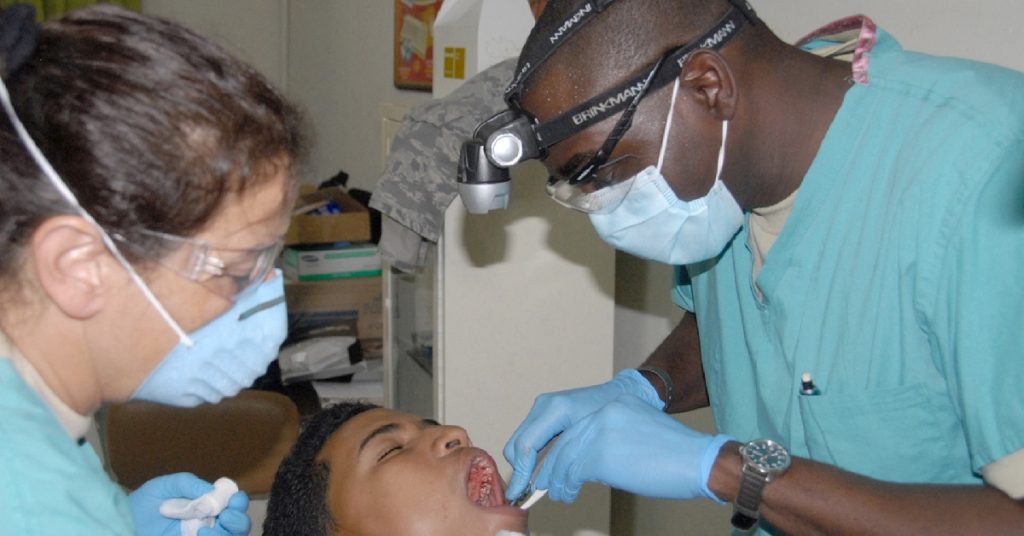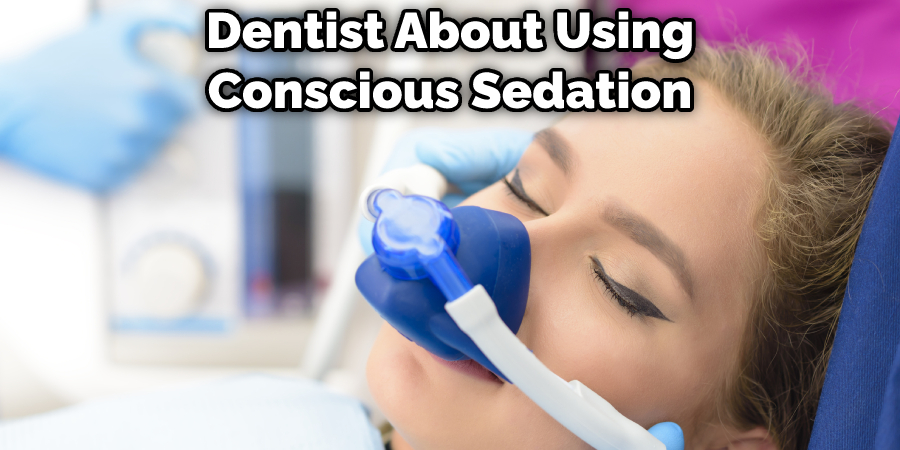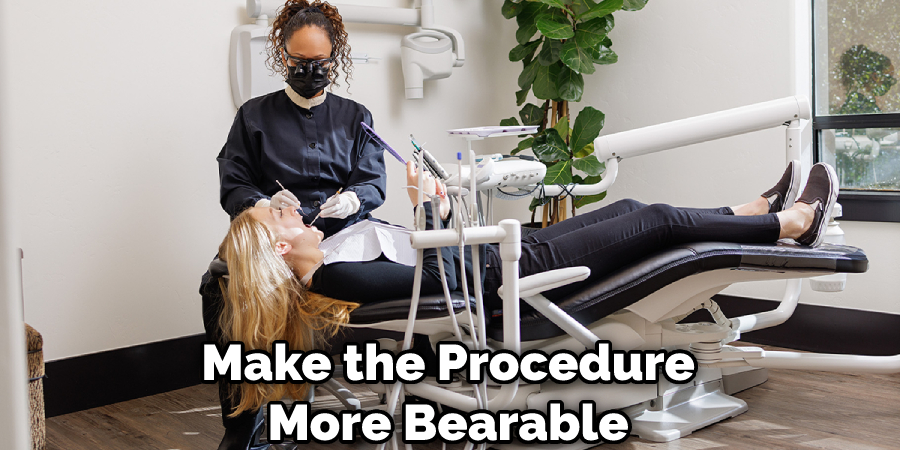Dental anxiety is a common concern for many people, and it’s completely normal to feel anxious or nervous about visiting the dentist. However, this anxiety can sometimes prevent people from getting the dental care they need, negatively impacting their oral health. You’re not alone if you struggle to relax in the dentist’s chair. In this blog post, we’ll explore a variety of strategies and techniques for how to relax in the dentist chair.

Whether you’re someone who gets anxious just thinking about the dentist or someone who has had a negative experience in the past, we hope these tips will help you feel more comfortable and confident in the dentist’s chair.
How Relaxation Can Help You During Dental Procedures
Here are five ways that relaxation can help you during dental procedures:
- Reduces anxiety and stress: Relaxation can help to stay calm your mind and body, making the experience of receiving dental care more pleasant and enjoyable.
- Improves physical comfort: When you’re relaxed, your body is in a more relaxed state, which can help to reduce physical symptoms such as increased heart rate and tense muscles, making the procedure more comfortable.
- Improves the effectiveness of treatment: When you’re relaxed, you’re more likely to follow the instructions of the dental team and cooperate with the dental treatment, which can improve the procedure’s outcome.
- Makes the procedure go more smoothly: When you’re relaxed, you’re more likely to feel calm and at ease, which can help to make the procedure go more smoothly and efficiently.
- Improves the overall experience: Relaxation can help to make the experience of receiving dental care more positive and enjoyable overall.
5 Simple Strategies for How to Relax in the Dentist Chair
Here are 5 Simple Strategies for Relaxing in the Dentist’s Chair During Dental Procedures:
Strategy 1: Take Deep Breaths and Focus on Your Breath
Deep breathing can help to calm your mind and body and reduce anxiety. Try taking slow, deep breaths through your nose and out through your mouth to help you relax during your appointment.

Strategy 2: Listen to Music or an Audiobook Through Headphones
Listening to music or audiobooks through headphones can be a great way to distract yourself and relax during the procedure.
Strategy 3: Bring a Small Comfort Item, Like a Stuffed Animal or Blanket
Allowing yourself to bring a small comfort item, like a stuffed animal or blanket, can help you feel more secure and at ease during the procedure.
Strategy 4: Communicate With Your Dentist and Dental Team About Any Concerns or Discomfort
Let your dentist and dental team know about any concerns or discomfort you may have, and ask questions if you’re unsure about anything. They are there to help you and make you comfortable.
Strategy 5: Consider Speaking With Your Dentist About Conscious Sedation Options
If your anxiety is severe, you may want to speak with your dentist about using conscious sedation during your procedure. This can help you relax and feel more at ease during the procedure.

Relaxation Tips for Children: Helping Your Children to Relax During Dental Procedures
Here are five tips for helping your children relax during dental procedures:
- Use positive language and reinforcement: Encourage your child and remind them that the dental team is there to help them and make them comfortable.
- Practice breathing techniques together: Deep breathing can help children relax and calm their minds. Practice taking deep breaths together before the appointment to help your child feel more at ease.
- Bring a comfort item: Allowing your child to bring a small comfort item, like a stuffed animal or blanket, can help them feel more secure and at ease during the procedure.
- Distract with toys or games: Bring along a small toy or game to help distract your child during the procedure.
- Consider using conscious sedation: If your child has severe dental anxiety, you may want to speak with the dentist about using conscious sedation to help them relax during the procedure.
Relaxation Tips for Seniors: Helping Seniors to Relax During Dental Procedures
Here are five tips for helping seniors relax during dental procedures:
- Communicate with the dental team: Let the dental team know about any concerns or discomfort you may have, and ask questions if you’re unsure about anything.
- Consider using conscious sedation: If you severely suffer from dental anxiety, you may want to speak with the dentist about using conscious sedation to help you relax during the procedure.
- Use relaxation techniques: Deep breathing, progressive muscle relaxation, and visualization are all techniques that can help seniors relax during dental procedures.
- Bring a comfort item: Allowing seniors to bring a small comfort item, like a stuffed animal or blanket, can help them feel more secure and at ease during the procedure.
- Distract with music or an audiobook: Listening to music or an audiobook through headphones can help seniors distract themselves and feel more at ease during the procedure.

10 Powerful Relaxation Tips for Those With Dental Anxiety: Overcoming Dental Anxiety With Relaxation Techniques
Tip 1: Take the Time to Find the Right Dentist
Finding a dentist who you feel comfortable with and trust can make a big difference in your level of anxiety. Look for a dentist who is patient, understanding, and willing to take the time to address your concerns.
Tip 2: Arrive Relaxed, Calm, and on Time
Plan your visit carefully, allowing plenty of time to arrive and park your car if driving. If you’re running late or have difficulty getting there on time, you’ll naturally be more stressed. If you have arrived for the dental visits, then sitting in the waiting room until your call/turn.
Tip 3: Practice Breathwork and Meditation Techniques
Techniques like deep breathing and mindfulness meditation can help to calm your nervous system and reduce anxiety. Consider practicing these techniques before your appointment to help you feel more at ease.
Tip 4: Bring a Friend for Emotional Support
Having a supportive friend or family member with you during your appointment can provide comfort and reassurance.
Tip 5: Listen to Music or a Podcast
Music or podcasts can be a great way to distract yourself and relax during the procedure.
Tip 6: Consider Using Sedation Dentistry
If your anxiety is severe, you may want to speak with your dentist about using conscious sedation during your procedure.
Tip 7: Exercise Your Brain With Puzzles or Planning
Don’t just sit in the dentist’s chair thinking about nothing or imagining what might happen. Use the time effectively by thinking about something that will tax your brain, such as solving a puzzle or planning your next vacation.
Tip 8: Sit Up Straight and Practice Deep Breathing Techniques
Good posture and deep breathing can help to relax your body and mind.
Tip 9: Set a Positive Intention and Use Mindfulness Skills
Set a positive intention for your appointment, such as “I am calm and relaxed during this procedure,” and use mindfulness techniques to focus on the present moment and let go of any anxiety.
Tip 10: Use Visualization and Guided Imagery Techniques
Visualization and guided imagery involve creating mental pictures in your mind of peaceful, calming scenes or experiences. This can help to relax your mind and body and make the procedure more bearable.

After the Procedure: What to Do After Your Dental Procedure to Help You Relax
Here are a few things you can do after your dental procedure to help you relax:
- Take it easy: Allow yourself time to rest and relax after your procedure. This can help your body and mind recover from the stress of the appointment.
- Use relaxation techniques: Consider using relaxation techniques, such as deep breathing or progressive muscle relaxation, to help you relax and unwind after your appointment.
- Get some exercise: Engaging in moderate physical activity, such as going for a walk or doing some gentle stretching, can help to reduce stress and improve your mood.
- Practice self-care: Take some time to do something that you enjoy and that makes you feel good. This could be taking a warm bath, reading a book, or spending time with loved ones.
- Follow your aftercare instructions: Be sure to follow any aftercare instructions provided by your dentist or dental team to ensure that your mouth is properly cared for and to help you heal quickly and comfortably.
Remember that everyone reacts differently to dental procedures, and it’s normal to feel discomfort or sensitivity after your appointment. If you’re feeling particularly anxious or uncomfortable, be sure to speak with your dentist or dental team for additional support and guidance.
Frequently Asked Questions (FAQs)
What Do They Give You at the Dentist to Calm You Down?
There are several options that dentists may use to help patients relax during dental procedures. One option is nitrous oxide, also known as laughing gas, which is inhaled through a mask and helps to reduce anxiety. Another option is an oral sedative, which is a type of medication that can be taken before the procedure to help patients feel more relaxed. Benzodiazepines, such as Valium and Xanax, are commonly used as oral sedatives in dentistry.
Some dentists may also offer conscious sedation, which involves the use of medication to help patients relax and feel more comfortable during the procedure. It is important to speak with your dentist about the best option for you based on your level of anxiety and the type of procedure being performed.
What is Fear of the Dentist Called?
The fear and anxiety of going to the dentist are commonly referred to as dentophobia (dental phobia) or odontophobia. It is a specific phobia, which is a type of anxiety disorder characterized by a persistent and irrational fear of a specific object, activity, or situation. People with dentophobia may experience extreme anxiety or panic when faced with the prospect of going to the dentist and may avoid seeking dental care as a result. Dentophobia can seriously affect a person’s oral health, as untreated dental problems can lead to more serious health issues.
You must consult a mental health professional for treatment and support if you have dentophobia. They can help you develop coping skills and strategies to manage your anxiety and get the dental care you need.
What Not to Do Before Dentist?
It is important to avoid eating or drinking anything for at least two hours before visiting the dentist. This will help ensure that you won’t be uncomfortable during the procedure and that you won’t experience any pain afterward. Additionally, avoiding caffeinated beverages such as coffee, tea, or soda can help reduce anxiety. It is also important to avoid taking any over-the-counter medications, such as ibuprofen or aspirin, before the procedure to reduce the risk of bleeding. Finally, it is important to avoid smoking before the appointment to prevent any irritation to the gums or other areas in the mouth.
Why Do Dentists Make Me Nervous?
Dentists can make people feel nervous for a variety of reasons. Fear of the unknown, fear of pain, or fear of judgment are all common factors. Some people also feel uncomfortable with the idea of being vulnerable in a dental chair or simply don’t like the feeling of having someone working in their mouth. It’s also common to feel anxious about the cost of dental care or the time commitment of appointments. Avoiding the dentist/ dental office that makes you nervous.
Whatever the cause of your anxiety, it is important to recognize and acknowledge it. Talking to your dentist about your feelings and concerns can help you find ways to manage your anxiety and get the dental care you need.
Conclusion
Ultimately, visiting the dentist can be nerve-wracking for some. Try deep breathing, playing music or audiobooks, bringing a familiar item, talking to the dental staff, and considering conscious sedation to make it easier. Communicate any discomfort to your dentist or dental team, and don’t hesitate to ask questions. They are there to help you feel comfortable. With these relaxation techniques and support, you can conquer dental fear and ensure good oral health.


